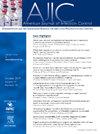Infection prevention and control in long-term care facilities in Florida: A needs assessment survey
IF 3.8
3区 医学
Q2 INFECTIOUS DISEASES
引用次数: 0
Abstract
Background
Although several surveys of infection prevention and control (IPC) practices have been conducted in the United States, none have focused on the state of Florida, which has the fourth-largest number of certified nursing facilities in the country. A needs assessment survey was conducted to better understand the specific needs and practices of individuals responsible for IPC in long-term care facilities (LTCFs) in Florida.
Methods
In November and December of 2022, a 90-question online survey was distributed to individuals responsible for IPC activities at 3,690 LTCFs in Florida. After omitting incomplete responses, 304 survey responses were analyzed using descriptive statistics.
Results
Survey responses regarding hand hygiene, sharps safety, and staff training reflect compliance with recommended IPC practices. Staffing shortages for registered nurses, licensed practical nurses, and certified nursing assistants were high among respondents (30%), while few reported shortages of personal protective equipment (5%). Only 11% of respondents state their facility requires flu vaccines, despite the high-risk environment of LTCFs. Concerning the built environment, the results suggest infection preventionists have limited awareness of the scope of heating, ventilation, and air conditioning systems in their facilities.
Conclusions
Some areas of compliance with IPC best practices were noted, but multiple opportunities for education and training on IPC best practices were identified.
佛罗里达州长期护理机构的感染预防与控制:需求评估调查。
背景:尽管美国已经开展了多项有关感染预防与控制(IPC)实践的调查,但没有一项调查是针对佛罗里达州的,而佛罗里达州拥有全国第四多的认证护理机构。为了更好地了解佛罗里达州长期护理机构(LTCF)中负责 IPC 的个人的具体需求和做法,我们开展了一项需求评估调查:2022 年 11 月和 12 月,我们向佛罗里达州 3,690 家长期护理机构中负责 IPC 活动的人员发放了一份包含 90 个问题的在线调查问卷。在剔除不完整的回复后,使用描述性统计对 304 份调查回复进行了分析:结果:有关手部卫生、利器安全和员工培训的调查回复反映出IPC实践符合建议的要求。受访者中注册护士、执业护士和注册护理助理的人员短缺率较高(30%),而报告个人防护设备短缺的人数很少(5%)。尽管 LTCF 的环境风险很高,但只有 11% 的受访者表示他们的机构需要接种流感疫苗。关于建筑环境,调查结果表明,感染预防人员对其设施中的供暖、通风和空调系统范围的认识有限:结论:我们注意到一些符合 IPC 最佳实践的领域,但也发现了 IPC 最佳实践教育和培训的多种机会。
本文章由计算机程序翻译,如有差异,请以英文原文为准。
求助全文
约1分钟内获得全文
求助全文
来源期刊
CiteScore
7.40
自引率
4.10%
发文量
479
审稿时长
24 days
期刊介绍:
AJIC covers key topics and issues in infection control and epidemiology. Infection control professionals, including physicians, nurses, and epidemiologists, rely on AJIC for peer-reviewed articles covering clinical topics as well as original research. As the official publication of the Association for Professionals in Infection Control and Epidemiology (APIC)

 求助内容:
求助内容: 应助结果提醒方式:
应助结果提醒方式:


